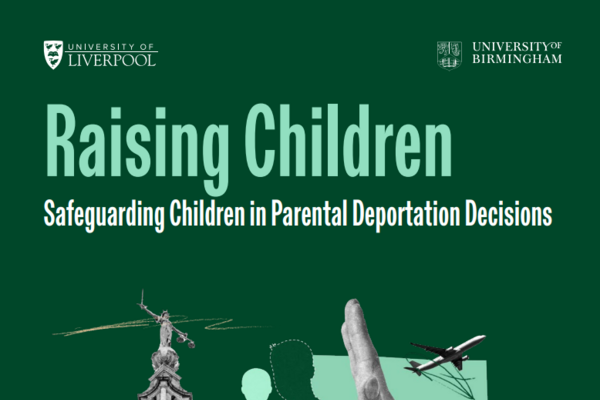All the names have been changed to protect our clients’ identities.
We have encountered a number of Iraqi nationals who have been detained from the community. Many have been in the UK for decades and have very few remaining connections in a country that has been torn apart by invasion and protracted conflict in recent years. Some people are fearful of the treatment they will receive upon return.
Those facing removal are seeking to resist their removal in whatever way they can. We recently received an email petition from Colnbrook IRC stating the following:
"We are 10 Kurdish asylum seekers who have been arrested by Home Office. Most of us here have kids, some of us have as much as 4-7 kids too. We ask that the Human Rights Organisation and the refugee department to help persuade Home Office into not deporting us back against our will, as it is also against the Law and our Human Rights as people too. None of us want to leave and destroy the families we have worked hard for in this country. We ask you to please help free us before it is too late.
Here are the names of the people in the detention centre of this address. They are all being deported back to Iraq on the 31st May. There are more people being deported too in other detention centres.”
Karim*, who has helped to organise the petition, told me that it was important to organise and protest with the other Iraqi detainees: “three or four here on my wing and others on different wings, and we communicate over the phone. It’s dangerous to send me back now. I’ve never been as terrified as this and it’s a different level. I’ve never in my life been so so so scared”
He has been in the UK for nearly 20 years and speaks 6 different languages, and has been detained on a number of occasions. He says that he worries about some of the other people in the detention centre, who don’t understand the system as well as he does, and he tries to help out where he can.
“There’s a lot of people here who have just arrived and are going to be sent to Rwanda. They’re from Afghanistan, some from Iraq, Syria, from all over the place. And I’ve been helping with translation. I always try to help people when I can. I’m not getting any money just helping people. These people are human beings and they have families. I’ve got a friend here who’s got a kidney problem and they want to give him paracetamol. He’s in pain and bleeding. Where’s the humanity. It’s really sad to see that, as a human being.”
The Home Office often claim that deportations are prevented by last minute legal claims. In BID’s experience, it may be that a last-minute claim is the only way to halt removal because people may never have had proper access to justice, and are given very little notice of removal. Karim indicated that the Home Office had deliberately delayed issuing him a ticket to obstruct efforts to obtain legal assistance.
“I’ve got to sign some papers but there is limited time. I’ve got a week to sort everything out. The ticket issued on the 14th May and they only gave it to me on Saturday (21st May), a week later, and they know it’s a weekend.”
“The whole process is shambolic. We are human beings. I’ve been here 20 years. I’ve got A-levels. I speak 6 different languages. I’m not a criminal or drug dealer, I haven’t done anything, just because I’m from Iraq, it doesn’t make me a criminal, the more I think about it, the more I get upset.”
His wife, Sarah*, who has been married to him for 17 years, told us about the painful ordeal that the family has been through. Despite the fact that Karim has reported every week for over a decade, she told us that 4 or 5 times the Home Office has showed up at her address to detain him.
“I’ve just finished paying the solicitor off, I can’t work any more because of the stress of it all is making me ill. I’ve just said to my friend this morning that I can’t do this any more. I cannot take this happening again. It’s too much. It’s heart breaking. Because he’s got mental health problems as well.”
“He’s been here 20 years. He’s got no family there. In Iraq where would he go, what would he do, no money, no nothing. What would happen to him over there? He was tortured over there. What would they do to him?”
Indeed, despite the planned charter flight, the UK’s Foreign and Commonwealth Office “continues to advise against all travel to Iraq, including the Kurdistan Region of Iraq.”
Sarah said that on the morning of his hearing in the First-tier Tribunal, the barrister said that they were not going to be successful, because the barrister knew the judge and said that he was the “worst judge on the circuit”. “They got a social worker to interview me and the whole family and Karim, they’ve come and done a big report, and a psychologist did a big report on him and the judge dismissed it, wouldn’t even look at that. He asked me 2 questions and didn’t ask any questions to my daughter or my granddaughter.”
“Some of them are having appalling treatment at the hands of our establishment. Not just my husband. The stuff I’ve read is disgusting. The detention centres are a money-making racket for the shareholders and boards of directors making millions of pounds of suffering on people’s human suffering.”
Sarah told us that because her husband speaks 5 languages, the guards and the Home Office are often asking him to translate for other detainees. “He said there were men being brought in yesterday off the boat and they’re going to ship them off to Rwanda. One of them is from Afghanistan. Can you imagine, you’ve come here fleeing persecution, you get to the UK, and you get sent to Rwanda. I think it’s absolutely disgusting. It’s a young Afghan lad. It makes me physically sick.”
“One of my cousins was a Chief Immigration Officer at Heathrow airport, he’s retired now. And my grandfather was an MP. And so was his father. Isn’t it funny how things work out. It’s disgusting what they’re doing, not just to my husband, to all people. I’ve seen a truck transporting sheep in the back of a lorry going to a slaughter and I looked at the sheep and I thought, that’s what they’re doing to refugees. It’s no different.”
Another man we have spoken to is Hasan*, a previous client of BID’s who we helped to secure release on bail in 2020. He told us that he was detained after an encounter with the police where he was unable to provide ID, so they referred him to the Home Office and said that he was an ‘illegal immigrant’ and would be detained. This is despite the fact that Hasan had been reporting to the Home Office and complied with his bail conditions. Hasan said the police officer “was a proper racist guy, he had it in for me” and because he doesn’t have photo ID, he was vulnerable.
Hasan reports that he has been in the UK for 20 years, and says that he doesn’t have a passport because he is Kurdish, and that he can’t be removed. He doesn’t have any family remaining in Iraq as they were killed a few years ago. He has a family in the UK – an 8-year old daughter and a partner who is pregnant –and his entire life is here. “I can’t be detained because my missus is 14 weeks pregnant and she’s got a broken leg and I need to look after my daughter. I’ve been suffering from mental health and every week I was reporting. I was doing badly and self-harming. Been going to therapy every week which has been helping.”
“People are worried, scared, not eating, self-harm, don’t want to go home, threatening to commit suicide, some people have been here 14 or 15 years. For some their whole family won’t accept them.
“I’m trying to help people calm down and make sure they don’t self-harm and make sure that they don’t worry too much.” He told the story of a friend of his who, tired of living under the hostile environment in the UK, agreed to return voluntarily to Iraq back in 2018 and was beaten so badly that he was left in a wheelchair.”
Hasan originally called because he was so worried about a man who he had met who had just arrived in the UK and was in detention. “There’s loads of Iraqis here and different nationalities. Some who just arrived in the country and they are being given 7 days to provide evidence. How can he do that? He doesn’t know anybody and he didn’t even properly understand that he was in England. He was beaten up by traffickers.”
Whether the Iraqi nationals in detention can in fact be removed is unclear. In the entire year of 2021 only 8 Iraqi nationals were removed. In every year since 2014, fewer than 12.5% of Iraqi nationals detained have been removed at the end of their period of detention – the overwhelming majority have been released on immigration bail.
There will doubtless be others. One of our clients faces being separated from his heavily pregnant partner. We do not know how many people the Home Office plans to deport, how many families will be torn apart, how many people will be returned to situations of danger or destitution. We will be fighting to defend the basic rights and access to justice for people detained facing deportation.
Help us build pressure to stop the flight by asking your MP to take a stand.









